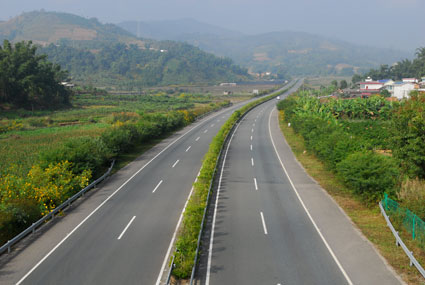Lagos-Ibadan Expressway: Bi-Courtney to build 14 pedestrian bridges
 Bi-Courtney Highway Services Nigeria Ltd. said on Tuesday that it would to ease crossing after the reconstruction of the Lagos-Ibadan Expressway.
Bi-Courtney Highway Services Nigeria Ltd. said on Tuesday that it would to ease crossing after the reconstruction of the Lagos-Ibadan Expressway.
Mr Dipo Kehinde, the company’s spokesman, who disclosed in Lagos, said the bridges would make crossing the road safe for pedestrians.
He said the bridges would reduce the carnage on the road, adding that the company was concerned about the challenges the highway had posed to road users.
He denied that the rehabilitation of the road had been abandoned.
“We have not allowed politics to stop our work because we are concerned about the horrors that road users face on that highway.
“The work is ongoing; it has moved to Aramed area, near Ibadan,” he said.
He said that some state government officials were not co-operating as they had discouraged their citizens from clearing illegal structures erected along the road.
“There is no way we can expand the road if we do not clear the structures on the Right of Way (ROW). But some state governments place public notice telling those who own the structures not to give way.
“All we can do now is to apply palliative measures pending the time that all political issues will be resolved,’’ he said.
Kehinde said that the company had spent about N150 million on asphalt for the rehabilitation of the distressed portions of the expressway under its palliative measure.
“This is further compounded by the stalling of the take-off of our 6.5 million dollars (about N90 million) asphalt plant, forcing us to buy asphalt at a very high cost.
“We have been using two gangs for overlay and two other gangs for patching. So far, we have used over 5,000 tonnes of asphalt.
“We would have spent less, if we were producing the bitumen from our asphalt plant,” he said.
Kehinde said the company had cleared and back-filled about 600-metres stretch at Ibafo, the southbound carriageway.
He said this had eased traffic congestion normally experienced along the stretch.
“So far, we have overlaid about 100,000 sq metres at Fidiwo, Sapade, Alapako, Kilometre 90, near Ibadan, Fatgbems at Isheri, Ibafo, and RCCG areas,” he added.
The company spokesman noted that the expressway, on completion, would have state-of-the-art facilities such as dawn lighting as well as improved and new interchanges.
Other facilities, he said, would include a new drainage system, recessed service areas, lay-by emergency parking areas, weigh bridges, electronic traffic control and information signs.
The Lagos-Ibadan Expressway was awarded to Bi-Courtney to manage under a 25-year concession arrangement valued at about N90 billion.
The company will recoup its investment through the administration of toll gates, and other charges on road support services such as trailer parks and rest areas.
Bi-Courtney is expected to modernise the highway by providing services and facilities to improve safety and security of motorists such as vehicular parking areas for heavy duty vehicles; rest areas with eateries and conveniences; emergency communications equipment and clinics and emergency ambulances.
Other facilities to be provided by the consortium are electronic traffic control and enforcement measures; highway lighting between 7 p.m. and 6 a.m. through the installation of a gas-fired plant; overhead pedestrian bridges at designated locations; modern toll points with electronic tolling system; and modern road signs and lane markings.
The scope of work includes the full reconstruction of the existing carriageways from Lagos to Ibadan; the provision of two additional lanes in each direction of travel between Lagos and Sagamu interchange/junction, making it four lanes in each direction of travel; the provision of associated facilities for the security and welfare of road users, free flow of traffic and toll collection.
The Lagos-Ibadan Expressway was constructed and inaugurated in August 1978 as a direct link between Lagos, Ibadan and other parts of the western states and beyond.
The road also provides links, leading to the eastern and northern parts of the country. (NAN)







